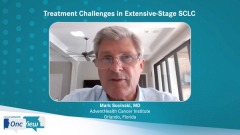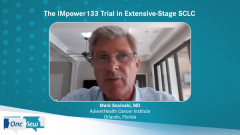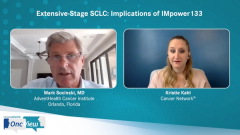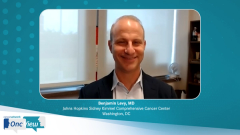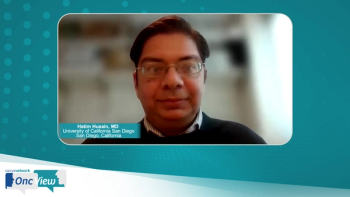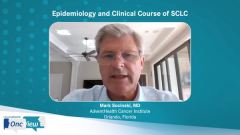
Treatment Challenges in Extensive-Stage SCLC
A review of current options for management of SCLC and the challenges of treating this population.
Episodes in this series

Kristie Kahl: How is extensive-stage small cell lung cancer defined? How does it differ from metastatic small cell lung cancer?
Mark Socinski, MD: It really doesn’t differ from metastatic small cell lung cancer. As I mentioned, we should be thinking of this in the context of the TNM staging system. Extensive-stage small cell lung cancer would essentially be stage IV disease, and that is equated to the term metastatic. Extensive-stage disease is disease that is beyond a reasonable radiation port. It can include a malignant pleural effusion, liver metastases, brain metastases, or bone metastases—these sorts of things. I look at the terms extensive-stage small cell, metastatic small cell, and stage IV small cell as all meaning the same thing.
Kristie Kahl: What percentage of patients first present with extensive-stage small cell lung cancer?
Mark Socinski, MD: Unfortunately, it’s about 70% or so. It’s the majority of patients. As I mentioned, this is an aggressive disease clinically. For many of these patients their first presentation is a hospitalization because they have some complication of their treatment: They’re sick, they get into the hospital, and they’re discovered to have extensive-stage small cell lung cancer. The majority of patients present with extensive-stage disease.
Kristie Kahl: What are some challenges specific to treating extensive-stage small cell lung cancer?
Mark Socinski, MD: As I mentioned, this is a smoking-related disease. The median age of this population is about 70 years. If you combine smoking and an old age, you get a bunch of comorbidities that are associated with this. People have COPD [chronic obstructive pulmonary disease], cardiac disease, atherosclerotic disease, sometimes cerebrovascular disease, diabetes. Other kind of diseases that go along with an older population. That really makes it difficult. Now that 70% of patients are presenting with extensive-stage disease, there are implications with regard to performance status. These patients get sick, and it’s difficult for them. Performance status is often an issue. The complexity of managing the comorbidities, a declining performance status, disease-related symptoms, complications of disease. Also, I haven’t pointed it out yet, but this is a disease in which there are high number of paraneoplastic syndromes. A syndrome of inappropriate ADH [antidiuretic hormone] is a common one. You can develop Cushing disease. There are a number of neurological paraneoplastic syndromes that can occur with extensive-stage small cell lung cancer. Those can be quite challenging. We see them in small cell lung cancer, but we typically don’t see them that often in non–small cell lung cancer.
Kristie Kahl: What’s the prognosis for patients at this stage of the disease?
Mark Socinski, MD: The expectation from our old standard of platinum-based therapies is a median survival of about 10 months. Response rates would typically be in the 60%-to-70% range. The median progression-free survival would typically be 4 to 5 months. And the 1 year survival in the phase 3 trials that have been done over the past decade is just above or just below 40%. Most people do unfortunately die of this disease in the first year after diagnosis. As I mentioned, with platinum-based doublets, the 2-year survival is typically less than 15%.
Kristie Kahl: To bring it all together, what are the unmet needs in this patient population?
Mark Socinski, MD: It’s developing more effective therapy. It’s been a challenge again because of the complex molecular nature of this disease and it being a very refractory disease. We’ve been stuck in the platinum doublet standard of care for a couple of decades and really nothing has changed that until we began incorporating immunotherapy into first line treatment.
Transcript edited for clarity.
Newsletter
Stay up to date on recent advances in the multidisciplinary approach to cancer.



